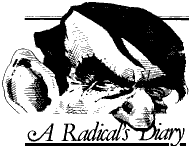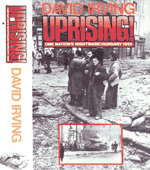October
20, 2003 (Monday) BRITISH Airways flight to Budapest. First time here in twenty-five years or more. The last time I was here, in about 1979, the Janos Kádár regime was still in power. I had visited Hungary half a dozen times researching the anti-Communist insurrection of 1956. My resulting book Uprising appeared in October 1981, a sad year for the family, and I still remember driving around London's East End in the Rolls all night on the Saturday before the book was published in London, on tragic family business, and then stopping the car occasionally to pick up the early editions of the Sunday newspapers as they appeared, eager to see what the reviewers had to say. Post-war Hungary was a departure from my normal subject -- WWII, and I know that my regular readers did not like it. Nor did the reviewers, and as I bought each successive newspaper that night, their reviews seemed to get worse and worse, culminating in a violent attack in The Sunday Times by Communist renegade Arthur Koestler -- who later hanged himself [see below], though not because of the ungenerous review he had given my book -- and The Observer's review by Neal Ascherson, the impartial tone of which can be assessed from its title, "A Bucketful of Slime." What these two, and others like them, resented, was the list of dramatis personae published at the beginning of the book at the suggestion of my editor at the London publisher Hodder & Stoughton; he had asked that I should specifically identify the religion of each person, whether Calvinist, Jewish or Catholic, as this detail seemed to play an important part in the unfolding story: indeed it did, and as it turned out that the top Communist leaders, secret police chiefs, and torturers; and the most despicable intellectuals in the story were all Jewish, which the heroes were almost without exception not, I can well understand the squirming that went on in the Koestler/Ascherson households.
At Budapest airport at two p.m.: I am met by publisher Tibor, and driver (Tibor too, a burly ex policeman). The city's suburbs sprawl, and are the ugliest I have yet seen: nothing in them has changed since the Fifties, nor probably since before then either. Filth, squalor, peeling stucco, graffiti, stray dogs, exposed brickwork, grim faces, dust everywhere. As for the book's promotion, Tibor tells me the familiar story: local televisions stations have cancelled attendance at tomorrow's book launch, bookstores are reluctant to take the book, distributors making problems. A radio and TV interview are still lined up. The Labour Party are back in power. The last prime minister here was a self-confessed member of the hated AVÓ, the secret police. "And Jewish?" I venture, and the driver nods. Most of the AVÓ leadership and officer corps were Jewish: which is why the worker's insurrection started on October 23, 1956 as a pogrom. If these funkcionáriusok are coming back into power, the wheel is swinging full circle. At the Ibis hotel, formerly the Volga Hotel, by three p.m. The hotel is of the worst possible ex-Soviet style. The room's phone lines are dead, the staff are surly. Ten days here is going to be worse than Pentonville. By six p.m. I have checked out into a different hotel. Publisher Tibor tells me that we have already lost two more locations, at Györ and Szeged; the hall managements capitulated under pressure. Never mind, alternatives have long been booked for just this eventuality. We know the people we are up against, the same old Traditional Enemies of Free Speech that I have been fighting for thirty years or more.
[Previous Radical's Diary] [William Murphy tells us how Arthur Koestler really killed himself]
| ||

 On
the plane to Budapest, I take out and read the Introduction
I wrote to
On
the plane to Budapest, I take out and read the Introduction
I wrote to